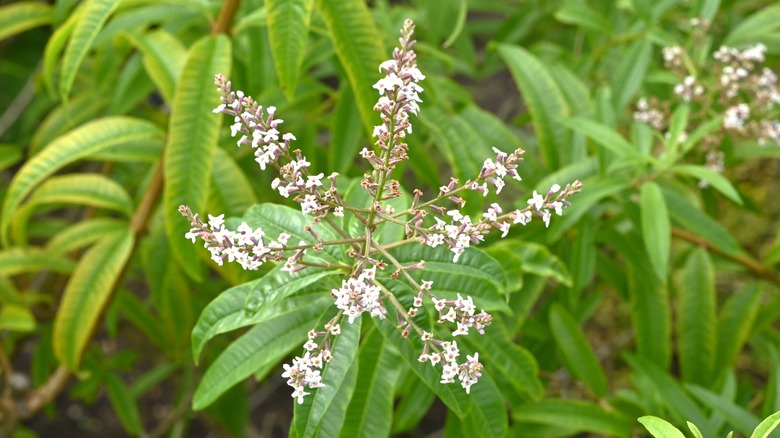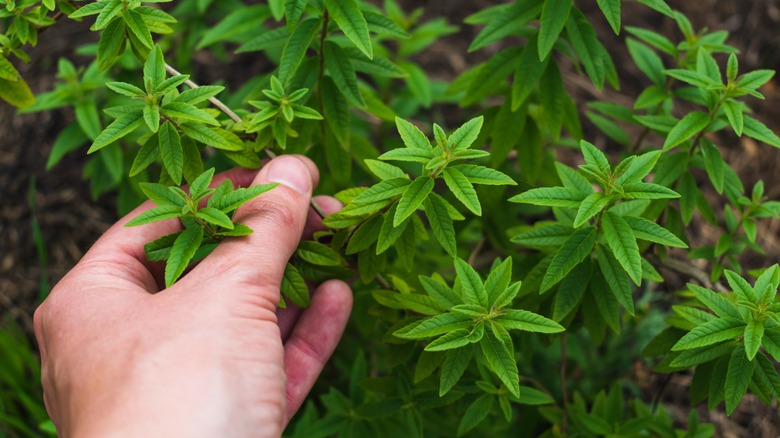The Plant Some Gardeners Grow To Deter Spiders Naturally & Does It Actually Work?
If the sight of a spider sends you running for cover, you might want to find ways to deter them from your garden. While this response is perfectly understandable for people who have a fear of arachnids, it's important to know that spiders can also be a benefit in the garden because they feast on the insects that might be damaging your ornamental plants and edible crops. While these eight-legged critters hunt, trap, and feed on the insects in our garden, they also provide an important food source for insect-feeding birds and baby birds that need all that protein to grow. If you have an aversion to spiders, consider which birds you want to attract to your yard.
But there might be areas in your yard or close to your house that you want to keep spider-free, and you may wonder if there's a natural solution that will deter arachnids from those areas. While not supported by any form of scientific data, some gardeners report that growing lemon verbena (Aloysia citriodora) will deter spiders from areas you don't want them to be. There's no solid evidence that this actually works, but it might be something that you want to try if you're keen to limit the amount of spiders that inhabit certain areas of your outdoor spaces. If you plant lemon verbena near your outdoor sitting areas, you certainly won't regret it.
Growing lemon verbena in your garden
Lemon verbena is a lemon-scented woody plant native to Argentina and Bolivia. It can be grown in USDA hardiness zones 8 through 10 and will also do well as a container plant indoors. In fact, growing this plant in a large pot on your patio, veranda, or other outdoor area may well keep the area relatively free from mosquitoes and other pests, thanks to the strong lemon fragrance of the leaves. But if you're going to do this, be aware that the plant is toxic to dogs, horses, and cats, so keep your pets away from it. Although lemon verbena has many culinary uses, it can also cause stomach upsets if not used in small quantities.
To grow this plant successfully, it needs a sunny position and well-drained soil full of organic matter. So, if you plan to grow lemon verbena in a container, make sure the pot has adequate drainage holes and use a premium potting mix for the best results. It's also important to keep your plant well-watered during its active growth period throughout the warmer months. In spring and early summer, the plant will produce masses of small white flowers on the ends of the branches. You can cut some of these and put them in a vase indoors to fill your home with a gorgeous citrusy fragrance. To avoid the plant becoming too leggy, it's recommended that you prune it to shape regularly.
Why do some gardeners believe that lemon verbena can deter spiders?
The reason why some gardeners believe that lemon verbena could possibly deter spiders is because of its strong lemon scent. Others think that this plant can repel a range of other insects as well. An older study published by the University of Chicago concluded that spiders do have a sense of smell and that strong odors do have the capacity to repel them. While lemon verbena wasn't included, this experiment used essential oils from various different plants including lavender, wintergreen, bergamot, cassia, clove, cedar, almond, juniper, mustard, and black pepper. In almost all cases, the spiders turned away from the strong fragrance emitted by these oils.
While these experiments used concentrated oils, which are far more potent than the plants they are derived from, the results may imply that spiders are averse to strong fragrances. So, growing lemon verbena in your yard or in containers might help to deter spiders from certain areas. At the very least, you'll have a lovely citrus-scented plant that will freshen up your outdoor living spaces and your home and bring a lovely scent indoors. In fact, you can just grow this plant indoors to give your home a natural lemony fragrance.


